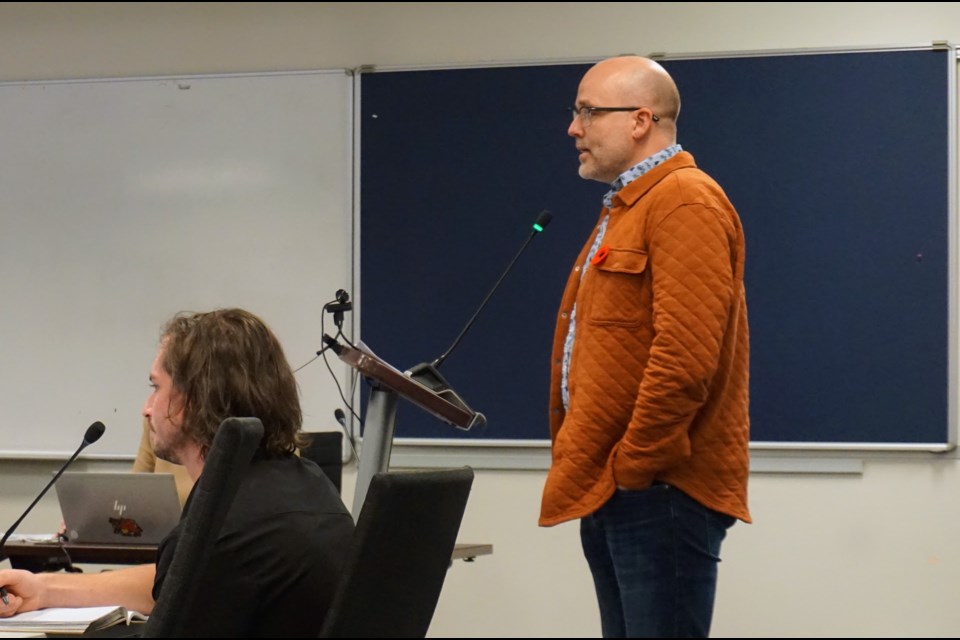After a public hearing, 撸奶社区council unanimously approved the third reading and adoption of a bylaw amendment that will remove density limitations on affordable housing projects.
On Nov. 7, the council held a public hearing on the bylaw amendment, which saw about 10 people speak in addition to email correspondence. All the council members were in attendance at the hearing. Mayor Armand Hurford and Coun. Lauren Greenlaw connected online despite being in Japan for a separate District of 撸奶社区matter.
In previous council meetings, municipal planner, Bryan Daly, said that the intent of the bylaw amendment is to eliminate the rezoning process, which could save between six months and one year in the development process and allow affordable rental projects to hit the market faster.
Public in attendance fairly split on the bylaw
The public in attendance was relatively split on support and opposition to the bylaw amendment, with some hoping to seek clarity on the amendment.
For those who were opposed, there were general concerns around the impact on neighbourhoods that have cheaper land values, parking and road capabilities to handle increased traffic, and instituting blanket legislation across town.
Toby Foord-Kelcey, who also emailed the District with some of his concerns, believed the legislation could negatively affect neighbourhoods with first-time homeowners and cheaper land values, impacting the homeowners who are the very same residents the legislation is supposed to be helping.
“They find themselves in a neighbourhood which is changing character, but there’s no offsetting benefit,” he said.
Another speaker, Jonathan Norton, said he believed the legislation would be better off taking slower implementation to understand the effects on neighbourhoods and infrastructure, likening the amendment to “a knee-jerk reaction.”
On the other hand, a couple of other speakers supported the amendment.
“I can tell you that having this bylaw in place will make it easier to gain project support, acquire funding and, ultimately, create more affordable housing for the people of Squamish,” said Cameron Cope, a director for the 撸奶社区Community Housing Society.
Kirby Brown also spoke as chair of the board for the 撸奶社区Community Housing Society.
“It clearly signals to senior government that 撸奶社区is a town that is committed to trying to do what it can to solve a very complicated problem,” said Brown. “If we’re going to get housing built, we need bylaws, and we need money, and one comes with the other.”
Daly said that affordable housing projects that only contain some affordable units would not be eligible to get height or lot coverage relaxations. They could be exempt from gross floor area calculations and parking relaxation depending on the unit types.
“100% of the units in a building has to be secured as affordable rental to secure all of those relaxations that are proposed,” said Daly.
Council approves third reading and adoption unanimously
After the hearing, the bylaw unanimously passed third reading and adoption, although there was some hesitancy among some councillors.
Coun. Eric Andersen said he was a “reluctant” and “nervous” supporter and cited a need to address issues like parking at the neighbourhood plan level. Still, he said he was hopeful planning processes would avoid uncertain outcomes.
Coun. Jenna Stoner spoke briefly that that would allow higher density on single-family lots throughout B.C. and that the amendment goes a step further.
“There are some specific areas that are zoned for the use of public service, which now will allow affordable housing in those zones as well,” she said.
Coun. Andrew Hamilton summed his thoughts up by saying, “This is one piece that local communities can contribute by making our bylaws and our zoning more amenable to affordable housing projects.”
Removing density limitations is partly due to the housing needs in Squamish, which Stoner described as “dire.”
The District’s 2023 Housing Needs Report identified an estimated 6,840 housing units are required by 2031, of which 2,873 (or 42%) will need to be affordable to those households earning $70,000 or less per year.
The municipality defines affordable housing as costing 30% or less to households that earn 80% or less of the median income in Squamish, a range of about $35,000 to $101,000. By that definition, monthly affordable housing costs range from about $875 to $2,525 per month.
View more information about this bylaw at .





